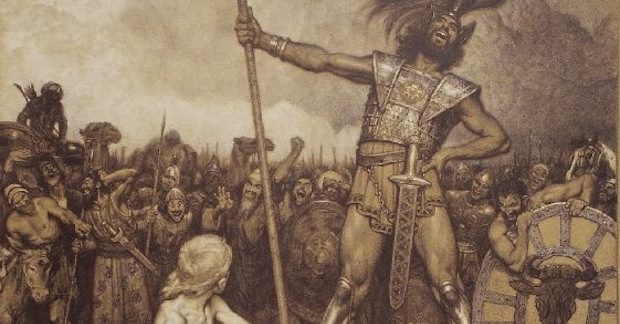Summary
Nate and Tim take a fresh look at the strange story of the Tower of Babel and piece together some surprising biblical passages that tell of God giving up and delegating other gods to rule the nations.
Transcription
Tim: When you encounter really uncomfortable ideas that are uncomfortable one, because you don’t have any idea what the heck it means, and two, because if it means anything like what it seems to mean, you just don’t have a framework for that and things start to get really confusing.
Nate: Well, we’re going to try to wrap up this complicated, murky, sometimes weird and discomforting reexamination of the fall. We’ve made the case that the fall is more than one event. It’s this collection of events, sort of like a story with multiple chapters. And the whole reason we’re doing this is because the way any story works, especially the biblical story, is there’s a problem, and that problem needs to be overcome. In the biblical story, just with the amount of text, the problem is very close to the beginning. I mean, literally, everything starts to go wrong in chapter 3 of the first book. So most of the Bible, which most of us care deeply about, is about resolving a problem, and if we have greatly misunderstood what this problem is, or what’s involved in that problem, or the elements of the problem, we’re just bound to misunderstand a lot of what’s going on in the whole rest of the story that’s an attempt to try to resolve this problem. So this is our last episode on the fall. In our previous episode, it was probably the headiest, murkiest water we want to get into on the podcast. This one will probably be a little more interesting, and when we get done here, it’s sort of a wide open door that will shoot us out of Genesis 11 into the whole rest of the story of the Bible. And we’ll have a bunch of other conversations upcoming about many topics that this leads right into. So here we go, let’s jump right in.
[transitional music]
Tim: So last time we talked about the first piece in this summary, that is a reference to some greater story, some greater sort of archetypal, mythical narrative that was expected to be in most people’s minds, that is about some sort of divine rebellion of some divine being or beings against Yahweh in an act of against the people who were allowed to rule in place of those divine beings here on earth. And a part of what that entailed is immorality and what looks essentially like a kind of —- or at least forced relationship, forced marriage, by the part of these sons of God, which is a term for divine beings, to the daughters of men.
Genesis 6:1-4 When human beings began to increase in number on the earth and daughters were born to them, the sons of God saw that the daughters of humans were beautiful and they married any of them they chose. Then the LORD said, “My spirit will not contend with humans forever, for they are mortal. Their days will be one hundred and twenty years.” The Nephilim [or giants] were on the earth in those days and also afterward, when the sons of God went to the daughters of humans and had children by them. They were the heroes of old, men of renown.
Tim: Now, we’re going to keep moving forward, but before we do, we’re going to take another jump backward. The first part of the fall we talked about was making a case that the main problem that shows up in the so-called curses, or the consequences, of Adam and Eve’s rebellion, is that rather than being able to partner the unseen spiritual world and the seen, natural, earthly world, rather than humans and the divine beings being able to partner to rule on earth, there was a essentially this great chasm of enmity between those species, and it was now up to men and women, Adam and Eve alone, and whoever they could procreate, whatever kids they could have, to do the work of cultivating and ruling the world. And so we highlighted essentially childbearing, reproduction and hard work as being the two edges of a double bladed sword, that they had to do all the work themselves, and the only people that could help them were the people that they could make through reproduction. And it gets represented as Adam’s burden and Eve’s burden, but it’s essentially the burden of humanity, that we’ve got to do this whole thing on our own now. It’s no coincidence, then, that as soon as you move forward and you start in Genesis 4, the first thing that it mentions is Adam and Eve having kids. That idea of procreation and the necessity—it wasn’t supposed to be, but now because they no longer have access to the Tree of Life, they no longer have immortality, the only way that there could be a version of immortality is through their children. If you move on to Genesis 6… Nate and I were kind of talking back and forth, sort of clarifying in the question and response. If Adam and Eve never really went to, they didn’t go to the side of the divine beings, they didn’t join that rebellion, they actually ended up in against them. Why was that an act of—what was the motivation for the serpent, essentially? And what we’re sort of playing with is this idea that if their main concern was that humans were ruling rather than them, and there was kind of this jealous motivation to take the power that Adam and Eve were given, it didn’t really matter whether they convinced them to join their rebellion. What they wanted to do was undermine Adam and Eve’s rulership, and they did it. They literally got them banished from the garden of Eden, essentially demoted, and lost their power and privilege, and was on. So you’ve got over power between two, let’s just call them races or realms of beings, and the main issue now facing humanity is reproduction. Then you move to Genesis 6, and what’s happening? Some of the people; not people, some of the divine beings, who have already waged —
Nate: Oh, this just clicked for me! This literally just clicked, I mean how many shows, we just did three shows on this. So this is part of the way they’re getting into the world, the divine beings are getting into the world again?
Tim: Yes, exactly.
Nate: Okay.
Tim: Yes, this wasn’t staged, Nate’s really clicking with things on the fly. This stuff, when it clicks, it’s like, to me it’s kind of mind-blowing. We don’t think about tactics, we certainly don’t think about as a tactic in the modern world, but any student of history knows that basically crime is one of the most notorious and destructive crimes in in old times. What’s happening is another act of between the divine beings and their realm. When we reached Jude and 2 Peter, one of the language of the terms being used is essentially they breached their boundaries and left their realm, came to our realm. Essentially they invaded human territory, and what did they do? They are essentially trying to corrupt the reproduction genepool of humanity and inserting their genes, their divine bloodline, into humanity’s royal tribe. It’s literally an act of warfare to try to take over authority by inserting literally their own bloodline into humanity. Does that make sense?
Nate: Yeah, that’s what was clicking for me, is like, “Okay, this is part of the tactic. They tried the, you have the serpent trying to do what he’s doing there in the garden in the beginning, and now you have, they’re just not stopping. They’re continuing the battle, and they’re going to enter into this world by procreation, basically.”
Tim: Right, so when we move forward, and all of a sudden in the next few verses, in verse 5 you see in chapter 6 in Genesis
5 The LORD saw how great the wickedness of the human race had become on the earth, and that every inclination of the thoughts of the human heart was only evil all the time. The LORD regretted that He had made human beings on the earth and His heart was deeply troubled. He said, “I will wipe them from the face of the earth.”
Tim: And what we get next is Noah and the flood story. And go back for a second and note this line in Genesis 6:4, The Nephilim [or giants] were on the earth in those days and also afterward. That little aside, which if we read it and don’t know what to do with it, we brush right over, is an absolutely central verse in the entire book of Genesis and the Old Testament. And we’ll basically circle back to this in another episode. The point of the flood is not just, if we’re reading this all in context here, in narrative context, is not just because humans are the only beings having any impact on the world and humans alone are really bad. There is a , and humans have been corrupted; literally their genepool has been corrupted. Their bloodline has been corrupted with other rebellious spirits, and that part of the chaos that is ensuing, that is part of the fall story, and God’s decision that that is so bad, things have gone so haywire that the two realms of people, two realms of beings, the spirit realm or the divine realm and the human realm, were supposed to be working together, and are now at and intermixed sexually, that you have semi-divine giants, is one of the central reasons God decides to have a kind of cataclysmic event. It’s to wipe out that line. And right here in chapter 6 we have a little foreshadowing aside that says, “Oh, and they were still around afterward.”
Nate: They being the Nephilim.
Tim: The Nephilim, the giants.
Nate: Now, just the giants? Or the giants mixed with the, what are they called, the sons of God?
Tim: So the idea is, and this Nephilim stuff gets played out later—
Nate: And does this mean that the flood didn’t wipe everybody out?
Tim: Essentially it does, and Jews have been trying to answer this conundrum, literally, in different texts and rabbinical commentaries, and now Jewish and Christian and all sort of scholars have been trying to figure out this conundrum for thousands of years. How is it, somehow, some part of this corrupted bloodline survived the flood and made it through afterward? There are a few different predominant solutions put forward. Some of them get really interesting. I’ve got my own, which involves the whole Ham/Shem story, and maybe we’ll get into that someday. It doesn’t clearly explain, but it clearly states that it happened. We’re just reading the text; that’s what’s important. It’s essentially probably always going to be speculation for the rest of us as to how exactly the flood failed to accomplish this thing.
Nate: They were good swimmers. That was my first thought—
Tim: [laughing] Maybe they were tall enough that the waters didn’t reach up to their heads?
Nate: That’s true. Could be stowaways? I don’t know!
[transitional music]
Tim: So again, we’re going to trace this giants theme, Nephilim or giants. It turns out, this isn’t just this weird little tidbit in Genesis 6. This is actually one of the key backdrops to almost the entire Old Testament, especially the narratives before you get up to the prophets. Just whether we see that or not makes a whole world of difference, and it’s going to get into conquests and what God was doing and all that sort of stuff. But for now, I want to go to two passages in Deuteronomy. Essentially what we’re going to transition to, as promised, is the Tower of Babel event, and essentially this Tower of Babel event in Genesis 11 is the last chapter of the story of the fall. Unfortunately, at least in my upbringing and theological training, we’re essentially taught that Genesis 11 is the only account of that Tower of Babel event, and because of that, I’ve essentially struggled for a really long time to use just Genesis 11 to understand what the heck is going on there. Recently, and getting some help from much smarter people than myself, realized there are actually at least two other texts in the Old Testament that are actually a reference to this same exact event, and they’re making sense of it in a slightly different way than the Genesis 11 account. Essentially, Genesis 11 is giving a kind of narrative depiction, and there are a couple verses in Deuteronomy that are more of a summary. So the first one we’ll look at, and this one we will probably talk about in a good majority of the episodes we do from here on out, is Deuteronomy 32, and specifically verse 8, and there’ll probably come a time where we do a bunch more stuff in Deuteronomy 32, but this verse will end up being one of the central verses for helping us make sense of what the problem of the Bible is and therefore what has to be done in order to solve that problem. So it says,
8 When the most high, Yahweh, gave the nations their inheritance, when He divided all mankind, He set up boundaries for the peoples according to the number of the sons of—
Tim: Your text here will say one of either two things: the sons of Israel or the sons of God.
—for the LORD’s portion is His people, Jacob His allotted inheritance.
Tim: Right, and this—
Nate: Mine says sons of Israel, and I feel like because of that, I’ve never thought anything about this verse before. Israel’s a normal word for me when I’m reading the Old Testament, so I just go past it.
Tim: Israel is a normal word for you, except if you remember that you’re in Deuteronomy, and the reality is that at this point in the story, what’s being referenced is the Tower of Babel event, which is in Genesis 11, before God even calls Abram. Hundreds of years before Israel is even an idea, maybe an idea in God’s mind, but certainly isn’t alive. This is an example, it’s a textual variant where there’s one text, perhaps two, that have the term Israel, and a whole world of texts that say sons of God, where it is elohim. It’s a complete consensus in the scholarship that the majority of texts and the better texts are the sons of God, that’s the best textual reading, and Israel is actually an error written in. And, in addition, just thinking logically in context, that can’t actually be what’s being talked about here when the event that Deuteronomy is addressing is an event in the past that happened before there were any Israel at all, let alone any sons of Israel to be counted and numbered. And it’s an example, then, of essentially a place, we can see in our translations, as an example of what we ourselves all struggle with. When you encounter really uncomfortable ideas that are uncomfortable one, because you don’t have any idea what the heck it means, and two, because if it means anything like what it seems to mean, you just don’t have a framework for that, and things start to get really confusing and uncomfortable. If there’s a way out of that, we’re going to take it. And so a whole bunch of translations like the NIV took what is essentially a cheating way out, taking what is recognized as the minority variation in a text, to say sons of Israel. Again the reading is When the Most High gave the nations their inheritance, when He divided all mankind, He set up boundaries for the peoples according to the number of the sons of God, for the LORD’s portion is His people, Jacob His allotted inheritance. There’s one more that’s essentially saying something very similar, again in Deuteronomy, again looking back to the Babel event. And I’ll kind of prove that in a sec. Deuteronomy 4:19. Remember I was talking about how it was common to equate the stars and celestial objects with divine beings?
Nate: Right.
Tim: This is one of those texts.
Deut. 4:19 And when you look up to the sky and see the sun, the moon, and the stars, all the heavenly array, do not be enticed into bowing down to them and worshipping things the LORD your God has apportioned to all the nations under heaven.
Tim: Just think with me about that for a second. You kind of track, it’s easy enough. Don’t worship the stars, don’t worship the sun, don’t worship the moon. You can either trust me that those are an illusion to actual divine beings, or you can think, “No, people were silly enough to just worship gaseous objects in space,” until you get to the point that simply asserts, that the LORD God has apportioned, allotted, assigned those beings, those things, those celestial objects, to the nations of the world. So take that, and we can go back to Deuteronomy 18. The point here is that God gave the nations to, in Deuteronomy 4, to these divine objects. In Deuteronomy 32:8, it actually says He divided up the world, people, based on the number of sons of God, another term for divine beings.
Nate: As in, if there were twenty sons of God, He divided the people up into twenty groups.
Tim: Yes, so we talked earlier about the borrowing of ideas from other religions, other cultures. One of the main ideas that we see similarity, or one of the main religious contexts of Israel’s neighbors where we see remarkable similarity between this divine council idea in the Bible is in Canaanite religion. And the high god was El, literally the same word that we use in the Old Testament for Yahweh, and Baal, who I think most of us are familiar with, because he gets named a lot in the Old Testament, was under the high god El but was essentially like the next in line. And Baal oversaw, or was head in line, of the council of El. And the council of El had seventy members. Now, when we go to Genesis 11—I’ve been making the case without proving it so far, that both of these verses in Deuteronomy are referencing the Tower of Babel event in Genesis 11. So when we go to Genesis 11, what we see is The whole world had one language and a common speech. And they made bricks, basically new technology, and this is another piece that we miss because we’re just not familiar with cultural contexts, they built a ziggurat. Essentially every scholar that’s worth listening to agrees that it’s a very clear indication of the text, that what they were trying to build was a ziggurat, which is a building specifically built to be kind of a mock mountain of God. Remember, we talked about how mountains were thought to be one of the dwelling places of the gods. A ziggurat was essentially meant to imitate a mountain so that if you built it, you could actually get God to come live on top of your mountain. It was a way of saying you are building sacred space yourself. You are building the new dwelling place of God; once you build it, God will come move into your dwelling place.
4 “Come, let us build ourselves a city with a tower that reaches to the heavens, so that we may make a name for ourselves; otherwise we will be scattered over the face of the whole earth.” But the LORD came down to see the city and the tower the people were building. The LORD said, “If as one people speaking the same language they have begun to do this, then nothing they plan to do will be impossible for them. Come, let us go down and confuse their language so they will not understand each other.” So the LORD scattered them from there over all the earth, and they stopped building the city. That is why it was called Babel, because there the LORD confused the language of the whole world. From there the LORD scattered them over the face of the whole earth.
Tim: So in Genesis 11, it doesn’t say God scattered them over the face of the whole earth and assigned them to other gods, but that is exactly what both of those verses in Deuteronomy are connecting to.
Nate: Divine outsourcing?
Tim: It’s exactly that. The idea is a disinheriting, that essentially Yahweh was supposed to be the ultimate ruler. He moved to the garden of Eden to be in our world, and things got so bad that He essentially is giving up for a second time. He already started over and reduced the world down to just Noah and a couple people in his family. This is essentially Him giving up again, not by slaughtering them, just simply saying, “I’m not going to be with these people,” and scattering them across the face of the earth. So part of why we get this confused, and it’s just a literary thing that’s foreign to us, is Genesis 11 and Genesis 10 are actually in reverse order. So if you look at Genesis 10, it’s called the Table of Nations. It’s the thing that most of us get to and we just skip it. We try to pronounce a few of the names for fun and then we skip right through it. But Genesis 10 is an account of all of the nations of the world, the known world at the time, tracing the descendants of the flood remnant and essentially naming the layout of the known land. People are spread out all over the place. The world described in Genesis 10 is not the world described in Genesis 11:1 that says Now the world had one language and a common speech, and that was all getting together in one city. It’s reversed in order. And it’s complicated, I’m not even sure I fully understand why that is, but essentially what you’re reading in Genesis 10 is a map in words of the world that results from the decision that God makes in Genesis 11, okay? So we have this idea that there was a council, a heavenly council, of seventy divine beings who, the high god El in Canaanite religion—in Israelite religion it’s Yahweh, who has a similar council to do His bidding, and that according to Deuteronomy, at this event God decides to walk away from being the God of this world, of these people, and essentially delegate off, apportion them out, allot them to these other nations. There are seventy members of the divine council, how many nations do you think are listed in the Table of Nations?
Nate: I’m going to go with seventy?
Tim: [laughing] It’s a good guess! I kind of set you up.
Nate: Oh, dang it.
Tim: You can count them, it is seventy! It’s not a coincidence at all, and it would have just been a very clear basic point, and we’ll reiterate this a little later, when later on in the story God raises up Israel, Israel goes into Egypt, God rescues Israel in the exodus and they’re on the bottom of Sinai supposed to start the covenant with God. There’s this moment when God tells Moses and Aaron to bring up elders to sit in a meeting with God on the mountain. It’s a very clear reenactment to say this is a human version of God meeting with His council to send out decrees and judgments to rule the world. And how many elders does He tell Israel to bring up? It’s seventy. The number isn’t a random number. And then we’ll get really deep into this when we get into the New Testament and talk about Jesus sending out seventy disciples to go door to door preaching the gospel and casting out demons in the New Testament. Hold the brakes on that for a little bit. The idea here is there’s a disinheritance happening. It makes most sense when we look at what happens after Genesis 11. As soon as that story ends, from there the LORD scattered them over the face of the whole earth, it immediately starts to go through the genealogy that leads to Abram, and then in Genesis 12 God calls Abram and chooses Abram to be a people.
[transitional music]
Tim: So what happens is essentially there’s a moment where God is forced to basically give up a second time and changes strategy from hoping that the whole world, or at least the majority of that whole world will do the thing He called them to, but has promised to not just wipe everybody out from scratch again, and therefore makes an intentional decision that He’s essentially just going to let everybody else go their own way, and literally delegates them to the divine council members, to these other divine beings. And He’s going to start His own nation, another nation on top of the seventy. He’s going to start His own nation that He will personally, Yahweh, the one true ultimate ruling God, will personally be their tribal regional deity. It essentially is a trading strategy to say He’s going to go with this small, it’s the yeast metaphor, He’s going to have a small member within the larger community whole that is going to go about undoing what the whole is sort of perpetually doing. So that’s almost, almost the last piece of the fall, is this idea that God divides the nation up and actually delegates His power, His role as God over the people to the other nations of the world. So for one, just something to note—
Nate: To gods of the other nations of the world.
Tim: He delegates the role to gods. To other divine beings that are not the one true creator God. But to those nations, what predominantly ends up happening is they see that tribal god as the one true god, or the highest god. As capital-g god.
Nate: They see the one that was portioned to them.
Tim: Exactly. So we’ll actually circle back here. This one, it kind of had me scratching my head for a while, and I felt really stumped because in the end, Old Testament and New Testament, people are responsible for worshiping the wrong God. Now, there’s very much a sense in which this scattering of the nations is in part God saying it’s okay with Him that people have other gods beside Him. It’s not okay with Him that Israel has other gods beside Him because Israel is His nation, His chosen inheritance, His portion. The other gods all got their portion, their own nations. Israel is His. And so all of the idolatry gets hammered home. It’s why it’s so central to the identity of Israel, it’s why the shema is there, which we talked about earlier, is because Israel is not supposed to worship gods of other nations that aren’t their God, especially when they have the privilege of having the one true God as their little local, acting as their local mayor. You know it’d be like if Julius Caesar decided he’s going to choose your small town and be your mayor of your small town. It’s a flawed analogy in large part, but the idea is that not only do you have your own, but you’ve got one who’s far greater than all the others, which makes the idea of idolatry in Israel so scandalous and tragic and all that. But the piece that had me scratching my head, and still to a large extent does, is that is God saying it’s okay for these other nations to have these other beings. It’s His plan, it’s His decision that that’s the delegation that He wants to do. It’s at least to some extent okay with Him. Now the goal is that eventually God is going to use Abraham’s line to bless all of the nations of the world. So the point isn’t that He’s given up on all them. The point is that He’s changing His strategy for how to get them to live rightly, how to get the whole world to be as it was meant to be, by choosing one nation who will, essentially like yeast within a big batch of dough, start to have a transformative effect, a priestly effect from within as kind of this minority entity.
Nate: And sort of be what was intended from the garden.
Tim: Yeah, exactly. And this is where we’ll go in the future. Israel takes on these monumentous vocational identities of what it is they’re supposed to be doing that gets to the point not only that it’s a priestly, royal rulership identity, but it actually is a part of what turns out to be this cosmic between Adam and Eve and the serpent and the divine realm and the human realm and all that sort of thing. What had me scratching my head for a long time was, okay, if this was God’s choice, then in the end, where is the harmony broken? Why does God get angry at those other gods? Because later on what we come to find out is there’s basically this between Yahweh and these other gods. And still there are answers that aren’t given in the biblical texts, but we actually looked at Psalm 82 in our first podcast episode as one of the places where we see clear evidence that there’s more going on in the Bible than we laid on, because it has a scene of God talking to an assembly of other gods. And so we focused on verse 1 to say, “Hey, there’s more than one god in this conversation.” But if you actually go back to look at the point, what Psalm 82 is saying, we’ll read the whole thing, it’s a scene of God in a meeting over these same sons of God, His divine council, who He has now allotted the nations to, and at some point along the way, and this is where the Bible just doesn’t tell us this part of the story, they somehow breached their moral boundary in what they were supposed to be doing as the delegated regional overseer of these nations and get decreed as guilty in essentially rebelling against God in how they were treating that position. I’ll read the whole thing.
1 God presides in the great assembly—
Tim: That’s the divine council.
He renders judgment among the gods; “How long will you defend the unjust and show partiality to the wicked? Defend the weak and the fatherless; uphold the cause of the poor and the oppressed. Rescue the weak and the needy; deliver them from the hand of the wicked. The gods know nothing, they understand nothing. They walk about in darkness; all the foundations of the earth are shaken. I said, ‘You are gods, you are all sons of the Most High.’ But you will die like mere mortals; you will fall like every other ruler.”
Tim: And then God stops speaking, and the psalmist jumps in and says:
8 Rise up, O God, judge the earth, for all the nations are your inheritance.
Tim: ESV has Arise, O God, judge the earth; for you shall inherit the nations or shall inherit all the nations. In the future. So here’s the idea: so God is sitting at some point in time after He’s delegated the nations of the world to these other beings. He gets them all in a room and He judges that a) they’re not ruling justly. They’re not giving justice to the weak and the fatherless and they’re not maintaining the rights of the afflicted and the destitute. That’s what they’re supposed to be doing, they’re not doing it. He essentially insults them, saying, “You have no knowledge. You’re not wise,” and then issues a death sentence of sorts. At least an order that in the future they are going to at some point be punished for this, and even though they are immortal gods, His sons, nevertheless, like men they shall die, and they shall fall. And the the psalmist reiterates this whole worldview by saying, “Yeah, that’s what needs to happen. The state of things as the world being delegated to these other nations isn’t going well either, and the one true God needs to take back all of these nations. They belong to Him in the first place. So arise up, O God, judge the earth, come inherit these nations back.” So this is as close as I can get to making a whole picture of this, is God decided to disinherit the world, choose to just be the personal God of one small tribe of people, allow all the other nations of the world to be god-ed or led or ruled, but in the form of a divine being that ended up getting worshipped, as these other sons of God are tasked with doing that. And it seems to me that there are multiple elements, and there’s some other literature that plays of this, both that they were ruling unjustly, they’re not actually taking care of the people that they’re supposed to be taking care of, it seems in some places like they are trying to get those people to worship them as if they were Yahweh, which Yahweh is hugely angry at, and so they get decreed as guilty. And so this, even though we don’t get it until Psalm 82, is talking about some event that we’ve got to lump into our collective story of what the fall is and therefore what the resolution to that problem going forward is. So it’s a complicated picture, but this idea of disinheritance? It’s the whole idea that the premise of Israel as God’s inheritance is built on. And so there’s this whole cosmological and international system of politics that’s both divine and human and really complicated that’s in the head of these biblical authors that we’ve got to try and wrestle with to at least get our decent bearings on, so that as we move forward in the biblical narrative we can make sense of that piece.
Nate: Okay, well that’s pretty different than what I’ve always thought the first few chapters of Genesis were talking about. And like we’ve said, if we have the problem wrong, we’re naturally going to have the solution to that problem or problems wrong, which affects how we live and what we care about and how we are Christians. Now I do have a bunch of questions, so we’ll get into those in the next episode and then start to use some of this new framework to look at the issues people have with the Bible and see if what we know now helps relieve some of those tensions. So thanks for spending time with us. If you like this show and want other people to hear it too, the best way to do that is to go onto iTunes and leave a rating and a review for this show. It only takes about thirty seconds and it really does help other people find this show and check it out. Nate and Tim, signing off.
Tim: Peace.
Nate: All the music on Almost Heretical is produced by Cale Haugen. Go check him out.









